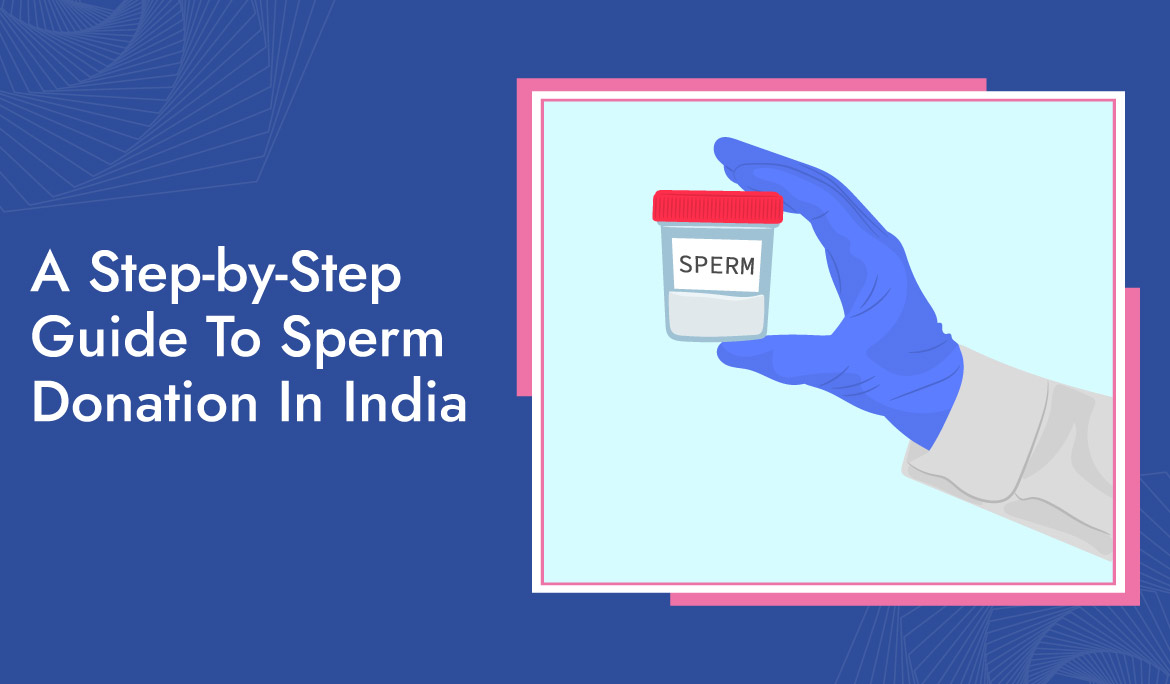Parenthood is a wonderful experience in itself. Watching a little human grow and caring for and nurturing them can be extremely rewarding. However, some people are unable to conceive or become parents through natural means due to reasons beyond their control. Sperm donors can be a lifeline for patients who are unable to conceive or want to conceive without a partner.
But what does sperm donation even mean, and who is it for? In this blog, we will answer these questions and explain the process of sperm donation in India. So, if you are looking for sperm donors or want to donate sperm, read this blog to the end to make an informed decision.
Take control of your fertility journey. Consult our expert today!
A] What Is Sperm Donation?
Sperm donation is a process in which a man donates his semen for assisted reproductive techniques for patients who are facing difficulty conceiving. Doctors extract the sperm from the semen, which will be later used. The sperm donor needs to follow some rules and predetermined precautions to ensure everything goes smoothly without any contamination. Once the sperm is donated, it can be used for two types of fertility treatments: intrauterine insemination (IUI) or in vitro fertilisation (IVF).
Types of Recipients:
- Heterosexual Couples with Male Infertility Issues: Hetrosexual couples who cannot conceive naturally due to male fertility issues like low sperm count, poor sperm motility, or genetic disorders can opt for natural conception through sperm donors.
- Single Women Who Wish to Have Children: Single women who wish to become mothers without a partner can choose intrauterine insemination (IUI) or in vitro fertilisation (IVF) to fulfill their dreams.
- Same-sex female couples seeking to have a child: Same-sex couples who wish to have a biological child can do so through donor sperm. In most cases, one parent gives the egg while the other carries it through reciprocal IVF.
Anonymity of the Donor
Sperm donors can choose to keep their identity confidential by providing sperm through a sperm bank. If the donor doesn’t wish to keep their identity anonymous, they can mention this to the sperm bank, which will let the recipient know their identity once the child is of legal age. Each option needs to be clearly evaluated by the donor.
B] What Is The Process Of Donating Sperm
Step 1: Screening and Eligibility
Before you can donate sperm, you need to first register yourself at any trusted and reputed sperm bank. During registration, you will need to share your personal information, like qualifications, job, age, sexual partners, and medical history. Once you are registered, you will be then moved to a physical and blood examination to test for diseases, genetic disorders, and general health. The most common screening tests include diseases like Gonorrhoea, HIV, chlamydia, hepatitis B, trichomonas, and syphilis. Candidates with multiple sexual partners, a history of drug use, and poor mental health are often rejected through the screening process.
Learn about the Impact Of Smoking On Sperm And Male Fertility.
Step 2: Semen Collection
Once the screening and testing process is complete, you become eligible for semen donation. You can donate sperm at either the same sperm bank that conducted the screening or its associated fertility clinic. The donor is seated in a private and sterile room within the facility, where they are left alone for semen collection through masturbation. The donor may need to provide fresh samples a few times a week. The doctor determines the frequency of donation. The donor also needs to abstain from ejaculation for 2–5 days before collection to improve sperm quality and quantity.
Step 3: Sperm Analysis and Quality Testing
Once the sperm has been donated, it is sent to a storage facility, where it is kept in cryogenic temperatures using liquid nitrogen. This preserves the sample for several years. Before storing the semen, it undergoes rigorous analysis in a laboratory to test its sperm count, motility, morphology, and overall viability. If the sample does not meet the standards, it is discarded. Only those that meet the standards are stored for future use.
Step 4: Donation
When a recipient is looking for assisted reproductive methods like IVF or IUI, they can choose a donor based on certain factors. These factors include physical traits, ethnicity, education, and personal background. It is to be noted that the donor will not be notified when the sperm is used for conception unless it is mentioned in the contract.
C] How to Be a Sperm Donor: Requirements
- A sperm donor in India should be between the ages of 18 and 39.
- The donor needs to pass certain medical screening tests and must not have any medical conditions or genetic disorders.
- They must not ejaculate for a few days (as recommended by the doctor) before donating sperm.
- Candidates should not smoke, drink alcohol, or have a history of drug use.
- They must sign a legal document stating they will have no legal rights over the child produced through the donated sperm. This is in accordance with the The Assisted Reproductive Technology (Regulation) Bill, 2020.
- While they do not need to be an Indian citizen, they must provide legal documentation for proof of identity.
D] The Role of Sperm Banks and Clinics
The sperm bank ensures the donor meets the strict health, genetic, and psychological criteria. Clinics select the candidates based on medical history, genetic testing, and overall sperm quality. Once the semen sample is received, they must test the sample for sperm count, motility, morphology, and overall viability. If everything is up to the standard, the sperm will be frozen using liquid nitrogen until a suitable match is found. The sperm banks and the clinics also ensure the donor does not have any infectious or genetic disease. It is also the responsibility of the sperm banks and clinics to limit the number of offspring per donor to prevent genetic risks.
Conclusion
Sperm donation has helped countless individuals and couples fulfill their dreams of becoming a parent. To become a sperm donor, a person has to go through a rigorous screening test to ensure only the best genetic samples are stored. Once the semen is collected, the sperm banks test it again to ensure its viability and store it for future use.
If you are looking for a fertility treatment such as IVF or IUI, visit Dr. Hrishikesh Pai, the leading fertility specialist in Mumbai.
Take control of your fertility journey. Consult our expert today!

Dr. Hrishikesh Pai
Dr. Hrishikesh Pai is one of India's leading fertility specialists, with over 40 years of expertise in reproductive medicine and the Founder of Bloom IVF Group. He plays an important role in advancements in fertility care, establishing 11 world-class IVF centres across the country. Dr. Pai received numerous awards and is an Honorary Professor at D.Y. Patil University, Navi Mumbai. He is well known for his compassionate approach and continues transforming lives by fulfilling people's dreams of becoming parents.













